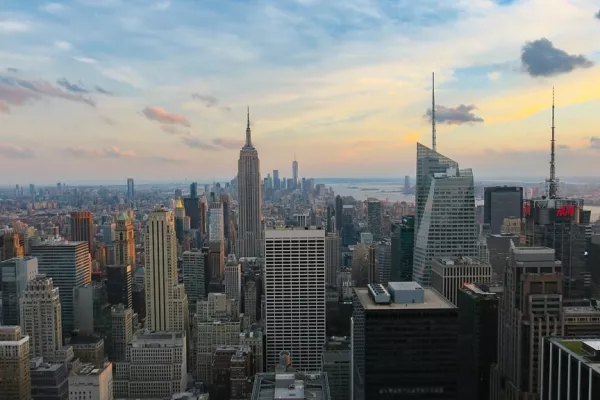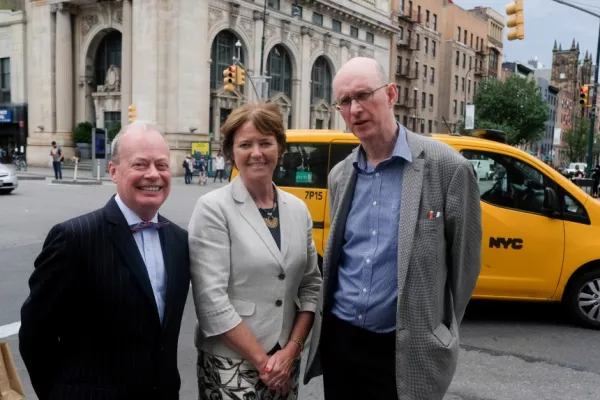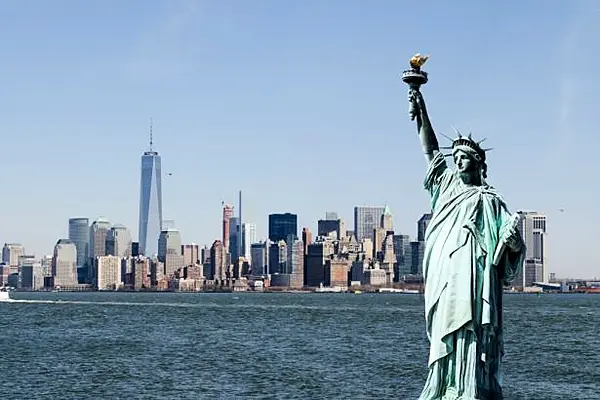The supply surge that's kept New York hotel room rates from rising for two and a half years may be starting to ease. That's good news for operators including Marriott International as the industry’s fight with Airbnb in the priciest US lodging market turns ugly.
Even with occupancy well above the national average, room rates in the city are down, declining 1.8 percent in the first half, amid a construction boom, according to STR. The supply of rooms rose an average of 4.8 percent annually from 2014 to 2016, the lodging-data provider said. Marriott’s second-quarter revenue after costs from owned and leased hotels fell to $102 million from $115 million, partly due to lower results in New York, the company said in its earnings statement Monday.
Now, with supply growth forecast at 3.7 percent this year and 3.3 percent next year, “we do expect to see some more positive performance in hopefully the next 18 months or so,” said Joseph Rael, director of financial performance at STR. “We’re definitely seeing new supply growth taper off a little” in New York.
New York is one of the few weak spots for an industry enjoying record earnings and a post-election rally. Global expansion and U.S. economic growth have lifted hotel stocks, even as the projected pickup in business travel, along with the corporate tax cuts that were supposed to spur it, haven’t come to pass. Marriott said on Monday that second-quarter adjusted earnings per diluted share rose 35 percent and worldwide revenue per available room, an industry measure of demand, rose 2.2 percent.
Marriott shares rose 1.1 percent Monday after the company announced an alliance with Alibaba Group Holding Ltd. to market to Chinese tourists on Alibaba’s fledgling travel service. Alibaba shares gained 3.6 percent.
The U.S. hotel industry’s fight with Airbnb Inc. escalated on July 31, when the Hotel Association of New York City and the city’s hotel labor unions began airing a television ad that to some implied that Airbnb could harbor terrorists.
Illegal Listings
The ad employs ominous music and the caption, “Who’s in your building?” It says Airbnb allows illegal listings and refuses to provide the addresses to law enforcement, then shows police outside the building where the terrorist behind the May 22 bombing at a pop concert in the English city of Manchester had reportedly rented a room through “a local online Realtor.’’
“Airbnb had nothing to do with this tragedy and using these attacks in a cynical corporate P.R. campaign is despicable,’’ Josh Meltzer, Airbnb’s head of public policy in New York, wrote in letters to 13 hotel chief executive officers, including those of Marriott, Hilton Worldwide Holdings Inc., Hyatt Hotels Corp. and Wyndham Worldwide Corp.
Marriott declined to comment about the ad. The trade group rejected the notion that it tries to connect Airbnb with terrorism.
Competitive Market
“Our ad does not say that’’ Airbnb rented to terrorists, said Vijay Dandapani, president and CEO of the association. “The focus of our ad was pointing out the lack of transparency, the lack of addresses that stem from not just Airbnb but most illegal hotels. We’re pointing out there’s a huge lack of security in many of these platforms. They don’t have to comply with the high level of security we have in hotels.’’
The stakes are high in New York, one of the top three markets for Airbnb listings worldwide. In October, New York State passed legislation that fines people advertising rentals of less than 30 days.
“We have seen a bit of improvement” in hotel-revenue data since then, said Rich Hightower, an analyst at Evercore ISI. “It’s not what I would call a game changer.”
Hightower has an underperform rating on Marriott following a share-price increase.
“New York will continue to be a tough market” because supply is still growing, said Christopher Agnew, an analyst at MKM Partners. He has a buy recommendation for Marriott. Given the international expansion of U.S. hotel brands, “any one market is much less important.”
News by Bloomberg - edited by Hospitality Ireland









